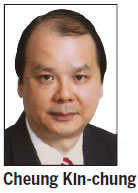Strategic and holistic planning for elderly care
Updated: 2014-01-28 07:49
By Cheung Kin-chung(HK Edition)
|
|||||||||
In face of a fast-growing aging population in Hong Kong, the Chief Executive in his 2014 Policy Address outlined a strategic and a holistic blueprint for elderly care policy.
We are conscious of the diverse needs of our senior citizens of different ages and the need for multi-faceted services. For the able-bodied elderly, we aim to create a social environment conducive to "active aging". For those with weaker physical conditions, we are offering them the necessary support according to their different level of care needs under our policy objective - "aging in place as the core, institutional care as back-up".
We endeavor to promote service diversity to enable dignified choices by our elderly citizens. We adopt a pragmatic, forward-looking and innovative approach in planning for the provision, enhancement and improvement of the hardware and software of elderly care services. In the process, we are taking steps to explore new and flexible modes of subsidy and service delivery, to strengthen medium and long-term planning, as well as to foster cross-sector collaboration.
In order to promote "active aging", we propose to inject HK$50 million into the Elder Academy Development Foundation to sustain the development of academies for the elderly and to explore new areas of development. We will also extend the highly popular Public Transport Fare Concession Scheme for the Elderly and Eligible Persons with Disabilities (commonly known as the "HK$2 concessionary fare" scheme) to green minibuses in phases starting from the first quarter of 2015.
We also plan to allocate additional resources to elderly centers to further strengthen the support provided for the elderly who are living in the community (including those suffering from dementia and their helpers). We adopted the "money-following-the-user" approach and launched the first phase of the Pilot Scheme on Community Care Service Voucher for the Elderly in September 2013. We will continue to provide additional resources to increase other subsidized community care services.
On residential care services for the elderly, we will continue to increase the supply through a multi-pronged approach. We will also seek to offer more diversified choices to our elderly citizens. To this end, we will launch a pilot scheme to purchase residential care places from an elderly home in Shenzhen which is operated by a Hong Kong non-governmental organization (NGO) to provide an option for elderly persons who are on the Central Waiting List for subsidized residential care places to live in the home concerned. We are also exploring similar arrangements with another elderly home run by a Hong Kong NGO in Zhaoqing.

Subsequent to the implementation of the Pilot Scheme on Community Care Service Voucher for the Elderly, the Chief Executive has tasked the Elderly Commission to explore the feasibility of introducing vouchers for residential care service for the elderly and to submit its recommendations in a year's time. If the Elderly Commission considers it viable to launch a pilot scheme on residential care service voucher, the government will provide the necessary resources. In this connection, the government has earmarked a total of HK$800 million for the issue of 3,000 vouchers in three phases for the three-year period from 2015-16 to 2017-18. Taking into account these 3, 000 vouchers, the government will provide about 5,000 additional subsidized residential care places within the current term of office. In the medium and long run, the "money-following-the-user" concept may stimulate the market to provide more quality residential care places for the elderly.
In spite of the keen competition for valuable land, the Labour and Welfare Bureau strives to maximize the number of service places for the elderly and people with disabilities through a Special Scheme on Privately Owned Sites for Welfare Uses. Through more flexible use of the Lotteries Fund and the provision of more targeted assistance during the planning and development process, the special scheme encourages social welfare organizations to put their land to better use through in-situ expansion or redevelopment and to provide more diversified services and self-financing facilities, in particular facilities for elderly and rehabilitation services.
I am glad that the special scheme has received support from about 40 organizations with some 60 preliminary proposals submitted. Based on the rough estimation of these organizations, about 17,000 additional service places for the elderly and people with disabilities can be generated. The special scheme demonstrates our determination to think creatively and find a breakthrough in the provision of care services. It also provides a basis for the planning of welfare facilities and manpower in the medium and long term. The government proposes to transfer HK$10 billion into the Lotteries Fund and provide the necessary assistance to facilitate social welfare organizations in taking forward their proposed projects.
Last but not least, the Chief Executive has tasked the Elderly Commission to prepare an Elderly Services Programme Plan within two years.
The author is secretary for labour and welfare of the HKSAR Government.
(HK Edition 01/28/2014 page9)